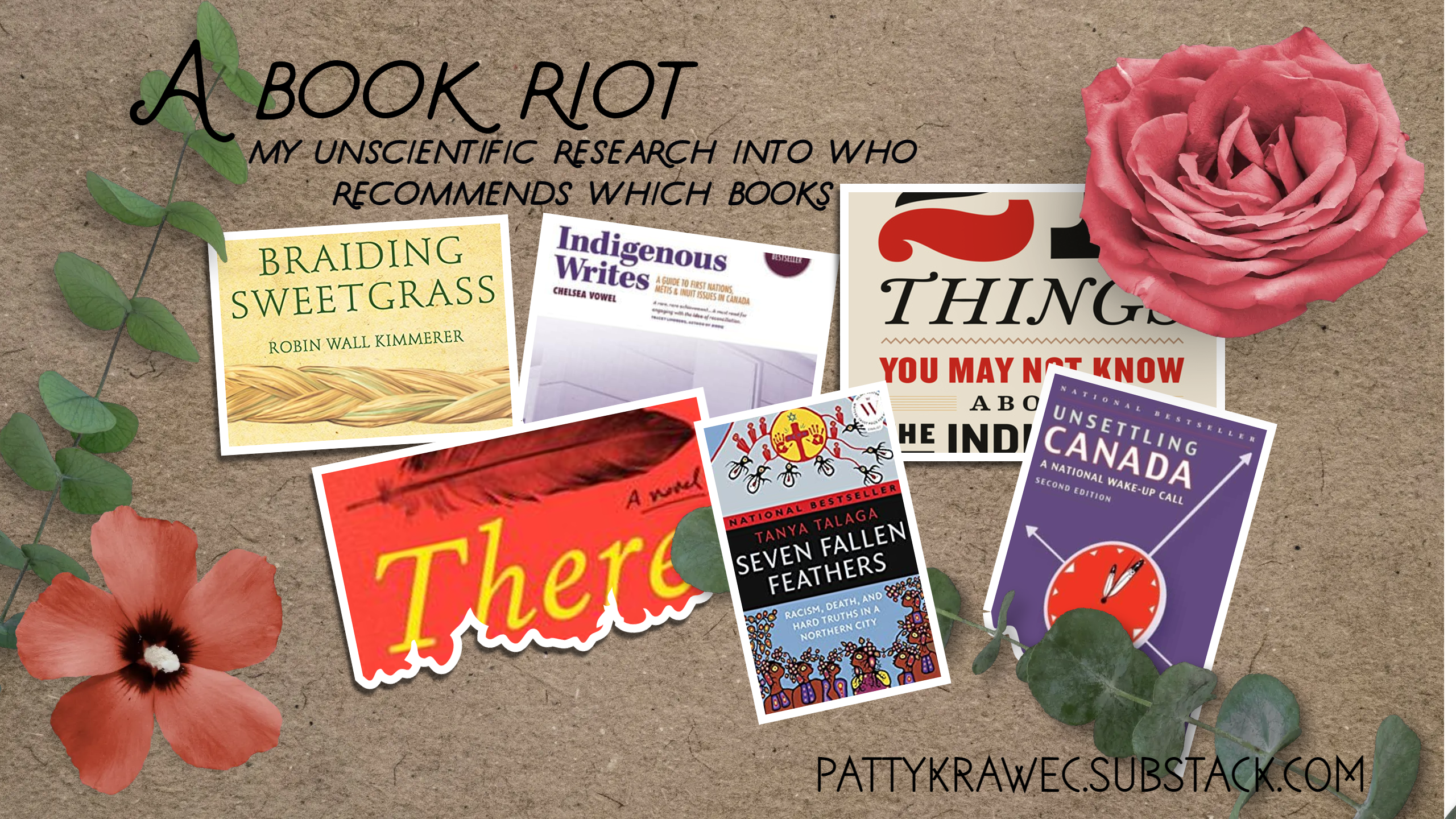I had a theory and the theory was that Indigenous people and Settlers would recommend different books so without any ethics oversight or methodology or even the most cursory of literature reviews to guide my questions I created a form that asked respondents to choose their identity (Settler, Indigenous to the Americas, or Displanted (Black)) and then to recommend 3 books that they think settlers should read. I made charts and a pivot table and you can see it all here. I’m not going to read too much into this most unscientific of research projects, but it made me think a few things.
While the two groups did generally recommend different books, there was some cross over and although I haven’t read all or even most of these books (wow I know) I can’t see any real material difference between the lists. They range from basic to intense. I got the most responses from Settlers, only three from Black readers. So like I said, deeply unscientific and possibly not even reliable but when has that ever stopped me from having thoughts and opinions. So let’s take a look.

I’m not going to go through it line by line, you can do that yourself and order books as you read but a couple of things stood out for me. Settlers love The Inconvenient Indian and Braiding Sweetgrass. Those got the most recommendations, followed by 21 Things About the Indian Act, Indigenous Writes, Seven Fallen Feathers and Art Manuel’s Unsettling Canada. For Indigenous respondents, 21 Things About the Indian Act was the only book recommended more than once. Braiding Sweetgrass and The Inconvenient Indian did get a mention along with Seven Fallen Feathers.
I thought I’d write an essay about how settlers don’t really want to be challenged, but that doesn’t seem to be the case. Although nobody could argue that Braiding Sweetgrass or The Inconvenient Indian are particularly confrontational, they both serve as reasonable entry points for people who are dipping into unfamiliar territory and with one exception these weren’t the only books that these particular settlers recommended. I don’t know if they started with these or what, but alongside these they went deeper into books about residential schools and history, current affairs and mental difference.
It surprised me a little to see Vine Deloria Jr and Art Manuel in the settler list but not in the Indigenous list. Most Indigenous people I know have read and revere both of these authors, maybe we just think that they aren’t something we would recommend to settlers? Maybe we’re concerned about Deloria’s acceptance of ancient aliens? I liked God is Red and I’ll admit that I stopped reading when he got to ancient aliens but I need to revisit it because Deloria has something of the trickster in him. Nobody mentioned Lawrence Gross’ book Anishinaabe Ways of Knowing And Being, but one of the things that he mentions is that Anishinaabe (and Dakota and others) rhetoric is not the same as European, we play with ideas and poke at them. Sometimes being ridiculous in the process. Tell long meandering stories instead of answering questions. I don’t know if Deloria really believes in ancient aliens, some people do. I get concerned when it becomes part of a white supremacist way of dismissing non-European innovation as if we were so primitive we couldn’t have thought of anything without ancient aliens (and now white people) to help us out.
Settlers by J. Sakai got a mention by each group. The Indigenous person who mentioned Sakai also mentioned Black Reconstruction in America by W E B Dubois which was a very interesting combination along with An Indigneous People’s History of the United States. I might need to do an essay on what those three say to each other because in one way or another each of those books speaks to the white supremacist project in the US. It’s a very complete history in three books. The settler recommended it along with Prison of Grass: Canada from a Native Point of View by Howard Adams and Bengali Harlem: lost histories of South Asian America by Vivek Bald which also sounds like it would be a great essay because wow. Thinking through Colonialism alongside South Asian immigration would be interesting.
I like Settlers and I think it is an important book for people to read, particularly if you are involved with organizing in any fashion because it critiques the labour movement as part of the colonial project rather than mobilizing against it. Whenever we work to address injustice we have to make choices about what we are seeking inclusion into and who we are leaving behind. The labour movement in Canada and the US left a lot of people behind, which brings me to the settler who recommended Harsha Walia’s book Border & Rule. Which I suspect also connects with Vivek Bald’s book.
Border & Rule looks at how countries around the globe deal with migration and immigration, the way that bordering regimes operate to expand their borders into other countries. Aid is often tied to policing migrants, ensuring that they don’t even get to the funding nation’s borders. She is writing about external borders, the edges of a country’s authority, but Indigenous nations make up internal borders that operate in much the same way. Aid is tied to movement, labour is extracted and the people unwanted, it is all in service to what Dunbar-Ortiz calls a fiscal military state.

So what am I left with? These are books about politics and residential schools, broad overviews of history and analyses of specific issues. There are books about Blackness and migrants, labour and legislation. Fiction and nonfiction and the fact is that shit is complicated. It is complicated and connected. And I would venture that some of these books will conflict with each other. They’ll give opposing or differing views on the same topic and that’s important for you to just hold onto. To think through what the author is trying to convey about how we exist as Indigenous people, what costs we are willing to bear, and where each of us draws the line we won’t cross.
A book riot
My unscientific research into who recommends which books
